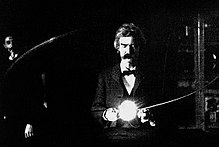Relationships
Tesla never married; he said his chastity was very helpful to his scientific abilities.[10]:33 However, toward the end of his life, he told a reporter, "Sometimes I feel that by not marrying, I made too great a sacrifice to my work ..."[31] There have been numerous accounts of women vying for Tesla's affection, even some madly in love with him.[citation needed] Tesla, though polite and soft-spoken, did not have any known relationships.
Tesla was asocial and prone to seclude himself with his work.[169][170][46][171] However, when he did engage in a social life, many people spoke very positively and admiringly of Tesla. Robert Underwood Johnson described him as attaining a "distinguished sweetness, sincerity, modesty, refinement, generosity, and force."[31] His loyal secretary, Dorothy Skerrit, wrote: "his genial smile and nobility of bearing always denoted the gentlemanly characteristics that were so ingrained in his soul."[16] Tesla's friend, Julian Hawthorne, wrote, "seldom did one meet a scientist or engineer who was also a poet, a philosopher, an appreciator of fine music, a linguist, and a connoisseur of food and drink."[citation needed]
Tesla was a good friend of Francis Marion Crawford, Robert Underwood Johnson,[172] Stanford White,[173] Fritz Lowenstein, George Scherff, and Kenneth Swezey's.[174][175][176] In middle age, Tesla became a close friend of Mark Twain's; they spent a lot of time together in his lab and elsewhere.[172] Twain notably described Tesla's induction motor invention as "the most valuable patent since the telephone."[177] In the late 1920s, Tesla also befriended George Sylvester Viereck, a poet, writer, mystic, and later, a Nazi propagandist. Tesla occasionally attended dinner parties held by Viereck and his wife.[178][179]
Tesla could be harsh at times and openly expressed disgust for overweight people, such as when he fired a secretary because of her weight.[10]:110 He was quick to criticize clothing; on several occasions, Tesla directed a subordinate to go home and change her dress.[10]:33
When Thomas Edison died in 1931, Tesla contributed the only negative opinion to the New York Times, buried in an extensive coverage of Edison's life:



No comments:
Post a Comment